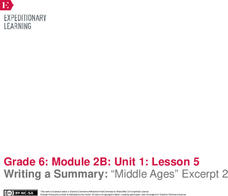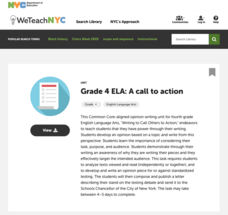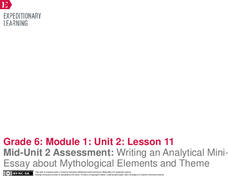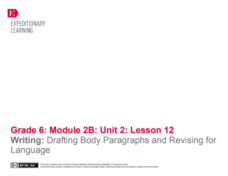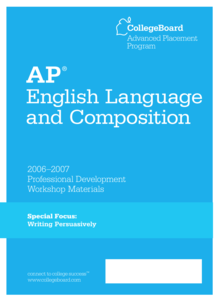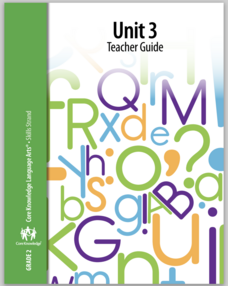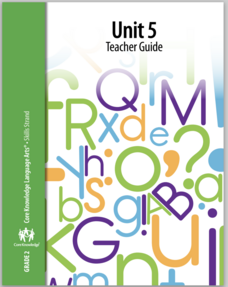EngageNY
End of Unit Assessment, Part 1, Continued: Revising Vocabulary and Conventions based on Feedback
Howdy, partner! Scholars partner up to look at the last two rows in the writing rubric. After discussing the details in the rubric about organization and conventions, learners use colored writing tools to circle feedback in their...
EngageNY
Writing a Summary: “Middle Ages” Excerpt 2
What is the big idea? Scholars use Middle Ages Excerpt 2 to complete a summary graphic organizer. They then use the information from the organizer to write a summary of the text on lined paper. Learners share summaries with the class.
EngageNY
Planning for Writing: Introduction and Conclusion of a Literary Argument Essay
After completing three body paragraphs of an argument essay about life's rules to live by from Bud, Not Buddy Christopher Paul Curtis, it's time to begin writing the introduction and conclusion. Independently, pupils draft the final two...
New York City Department of Education
Grade 4 Literacy in English Language Arts: A Call to Action
You have the power! Scholars learn that they have power of the pen in their writing. After reading and viewing various sources about standardized testing, they express their own opinions about the testing by writing letters to the...
EngageNY
Revising the Informative Consumer Guide: Sentence Structure, Transitions, and Works Cited
Transitions are the glue that link paragraphs together. Pupils listen to a mini lesson plan on sentence structure and transitions and use what they learned to revise their informative consumer guides. Next, they self-assess their writing...
EngageNY
End of Unit 2 Assessment, Part 1b: Writing Introduction and Conclusion
Writers continue looking at the rubric for their A Long Walk to Water essays. This time, they analyze the demands for the introduction and conclusion paragraphs. Pupils compare the rubric to the opening and closing of the model essay,...
EngageNY
Mid-Unit 2 Assessment: Writing an Analytical MiniEssay about Mythological Elements and Theme
Two is company. Scholars pair up to continue their mini essay writing from the previous lesson plan. They work on their introduction and conclusion paragraphs and then trade partners for peer feedback and a fresh set of eyes on their...
EngageNY
Writing: Drafting Body Paragraphs and Revising for Language
This is a formal affair. Scholars take a look at using formal writing in essays. They analyze the model essay Are We Medieval?: Opportunities in the Middle Ages and Today? They then begin working on the first draft of their own essays.
The New York Times
401 Prompts for Argumentative Writing
Sometimes the hardest thing about an argument essay writing assignment is coming up with a question. A four-page list of prompts includes a range of topics, from social media and smart phones to video games and sports. The list is a...
College Board
AP® English Language and Composition Special Focus: Writing Persuasively
It's not always easy to persuade others. However, it may even be harder to teach others how to be persuasive. Educators get personal insight from Brent Staples, an influential commentator, as well as gain ideas and activities on teaching...
EngageNY
Writing an Argument Essay: Developing Claims and Reasons
Scholars begin working on the end-of-unit writing prompt for Pygmalion. They must analyze their collected text evidence to determine what information is compelling enough to include in their argumentative essays. The teacher guides them...
Health Smart Virginia
Social Emotional Skills
A list of activity ideas, lessons, and resource links all focus on kindness, empathy, and mindfulness. Five steps offer experience in role-play, crafts, writing, thoughtful discussions, and more!
Core Knowledge Foundation
Third Grade Skills Unit 3: How Does Your Body Work?
A skills unit combines ELA and science with lessons that explore the human body. Lessons begin with a reading, go into skills practice, and offer take-home materials. Skills practice includes listening to and discussing a read-aloud,...
Core Knowledge Foundation
Second Grade Skills Unit 3: Kids Excel
The unit offers second graders skills practice in tricky spelling and words, grammar—nouns and punctuation, reading decodable texts, and writing a personal narrative. Lessons begin with a warm-up and go into a concept review, word work,...
Scholastic
Step-by-Step Strategies for Teaching Expository Writing
A carefully crafted, logically organized, 128-page packet is an excellent addition to your unit on expository writing.
Core Knowledge Foundation
Third Grade Skills Unit 4: Stories of Ancient Rome
A unit covering stories of Ancient Rome examines spelling rules, suffixes, verbs, quotation marks, writing, and dictionary skills. Lessons follow a similar routine; reading, skills practice, and extension activities, followed by...
Core Knowledge Foundation
Second Grade Skills Unit 2: Bedtime Tales
A unit covering second-grade skills reviews 16 letter-sound correspondences, tricky words, and punctuation. Readers provide context for examining story elements, and pupils participate in close reading and write narratives retelling a...
Core Knowledge Foundation
Second Grade Skills Unit 5: Sir Gus
A unit focuses on second-grade skills, specifically spelling, grammar, writing, and reading. Over six weeks, scholars review spelling patterns and tricky words, and explore verb tenses, adjectives, subjects, and predicates. They write...
Institute of Electrical and Electronics Engineers
Get it Write
In an effort to practice engineering design, STEM classes break out into teams and endeavor to make a working ink pen. To prepare, they read about writing implements through history, patents, and viscosity of liquids. Armed with this...
Core Knowledge Foundation
First Grade Skills Unit 6
A unit explores alternative spellings, ways to include nouns, pronouns, adjectives, and prepositions in sentences, and writing personal narratives. Over 25 lessons, first graders participate in whole group and small group instruction....
Core Knowledge Foundation
Third Grade Skills Unit 9: The Age of Exploration
The Age of Exploration is the theme of a unit designed to boost third-grade ELA skills. Scholars practice spelling patterns, examine words with prefixes and suffixes, build sentences with linking words, and use comparative and...
Core Knowledge Foundation
Third Grade Skills Unit 6: Gods, Giants, and Dwarves
The halfway mark of a series offers final skills practice in spelling patterns, suffixes, and building sentences with conjunctions in preparation for assessments that gauge proficiency. Remediation and enrichment follow the test results...
Core Knowledge Foundation
Third Grade Skills Unit 11: Introduction to Ecology
The concluding skills unit offers learning opportunities and reviews in preparation for assessments. Scholars participate in lessons that examine spelling patterns, prefixes, suffixes, pronouns, and adjectives, draft a letter, and listen...
Education.com
St. Patrick's Day Writing: If I Found a Pot of Gold...
This St. Patrick's Day, young writers imagine they found a pot of gold at the end of a rainbow. After a class discussion and brainstorming, scholars compose a narrative essay making sure they incorporate transitions and at least three...
Other popular searches
- Descriptive Writing Skills
- Check Writing Skills
- Middle School Writing Skills
- Beginning Writing Skills
- Sentence Writing Skills
- Banking Skills Check Writing
- Improving Writing Skills
- Early Writing Skills
- Letter Writing Skills
- Journalistic Writing Skills
- Writing Skills / Strategies
- Letter Writing Skills



